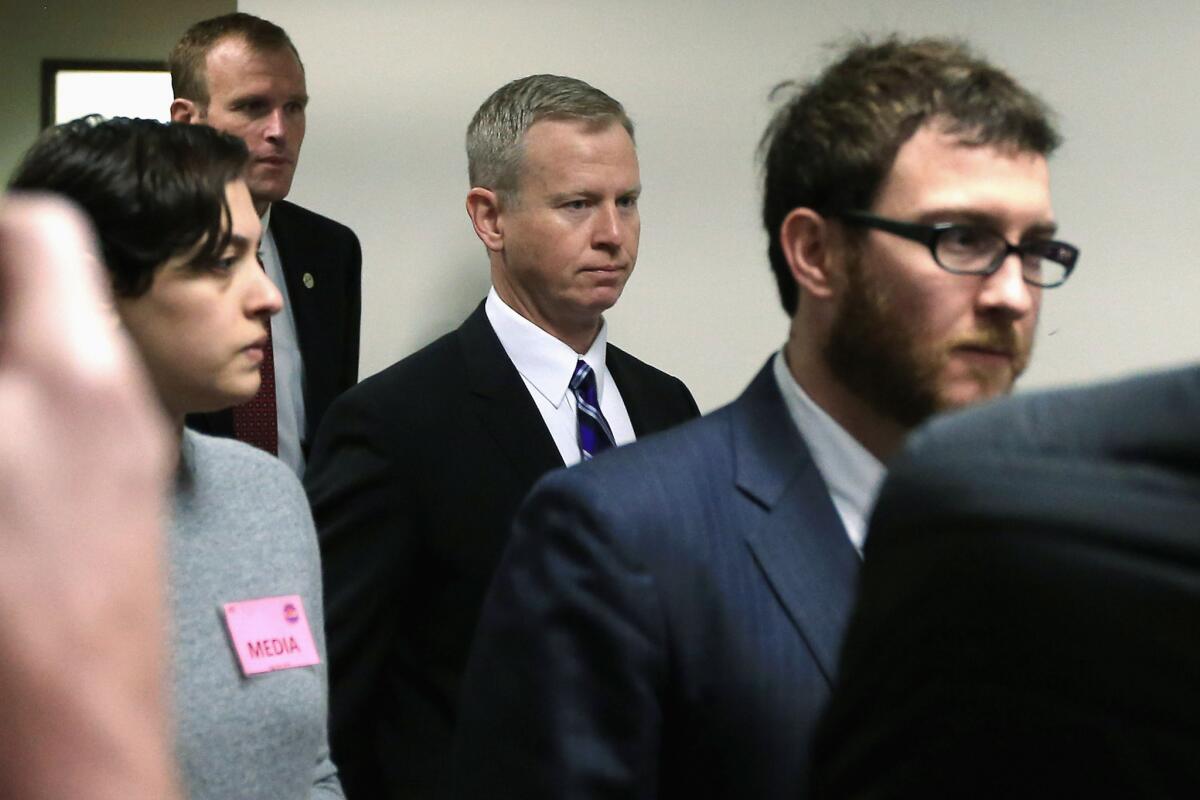Death penalty also on trial in Colorado theater shooting

CENTENNIAL, Colo. â Prosecutors are expected to announce Monday whether they will seek the death penalty in the Aurora movie theater massacre â a decision that could affect not only the defendant, James E. Holmes, but also capital punishment in Colorado.
As the critical decision loomed, the defense and prosecution were scrambling to win the upper hand â in the world of public opinion, if not the courtroom â in an escalating war of words.
Holmes, 25, a former neuroscience student, is accused of opening fire in a packed premiere showing of âThe Dark Knight Risesâ on July 20, killing 12 people and injuring about 70 others. The crime horrified the country and launched national discussions on gun control, mental illness and capital punishment.
PHOTOS: Colorado theater massacre
George Brauchler, district attorney for Coloradoâs 18th Judicial District, inherited the case when he was elected in November. Death penalty cases are rare in the state â the last execution in Colorado was in 1997 â and all three inmates on death row come from the 18th Judicial District.
The run-up to Brauchlerâs decision produced a flurry of last-minute, accusatory documents from both sides last week, signaling just how high the stakes have become.
âThere are issues beyond James Holmes here. This case has always been about capital punishment,â said Craig Silverman, a former Denver chief deputy district attorney now in private practice who has been closely watching the case.
He is sympathetic to Brauchlerâs dilemma.
âAs crude as it is, there are financial considerationsâ to a lengthy death penalty case, Silverman said. He points to another high-profile Colorado case in which convicted murderer Nathan Dunlap, the so-called Chuck E. Cheese killer, has been on death row for 19 years and only in February exhausted his appeals when the U.S. Supreme Court declined to hear the case.
But Silverman also acknowledges that because Colorado has capital punishment on its books, Brauchler may feel bound to use it.
âIf this case doesnât call for it, what does?â Silverman asked. If the death penalty is not used in a mass shooting that attracts worldwide attention, he wonders, would a future district attorney be reluctant to apply it to a less high-profile case?
Last week, Colorado legislators abandoned an effort to abolish the death penalty after Gov. John Hickenlooper, a Democrat, suggested he might veto it. A separate proposal to put the issue on the ballot was also scrapped. It is against this backdrop that the legal squabbling in the Holmes case erupted publicly.
The defense and prosecution are under a gag order, so the bickering has played out in legal filings.
On Wednesday, public defenders slipped into a routine court scheduling document a revelation: They had made a standing offer weeks ago to let Holmes plead guilty without the possibility of parole if Brauchler would take the death penalty off the table. They said it would bring closure for the victims.
âMr. Holmes is willing to resolve the case to bring the proceedings to a speedy and definite conclusion for all involved,â the filing said.
The defense also said that if the prosecution does not accept the plea, it will continue to pursue an insanity defense. If Holmes is found to be insane or suffer from mental defect, he cannot be put to death.
But an insanity defense could add months, if not more, to the proceedings, the defense warned.
The trial is scheduled to begin Aug. 5.
âIt puts the DA on the hot seat,â Silverman said. âIf they do go for the death penalty, the defense is going to blame the DA for every single delay. The refrain will be: The DA couldâve ended this all on April 1.â
But the prosecution was apparently unmoved, firing back the next day with a scathing 13-page response. Prosecutors cried foul over what they called a defense tactic designed to sway public opinion.
âThe filing is extremely unusual and unprecedented in that it attempts to involve this court in plea negotiations, in essence saying to the court: âIf the prosecution does not accept our offer then this court and those associated with this case will suffer by having to endure months of motions and months of a trial,ââ the prosecution said.
The prosecution, insisting it would not be bullied, further complained that it could not begin to entertain a plea deal without information that has been withheld by the defense.
In a related issue, prosecutors also argued in the filing that the defense should not be allowed to try to force a New York reporter to reveal her source for a story about sealed evidence.
The defense canât complain about leaked information, prosecutors argue, because defense lawyers violated the gag order when they revealed the plea offer in their court filing. A hearing on that matter is also scheduled Monday.
Chief Judge William Sylvester ruled late Thursday that despite the public dueling, the court hearing for announcing the death penalty decision and determining whether the reporter must testify will go on as scheduled.
On Friday, the judge also ruled that cameras would not be allowed in the courtroom.
More to Read
Sign up for Essential California
The most important California stories and recommendations in your inbox every morning.
You may occasionally receive promotional content from the Los Angeles Times.










